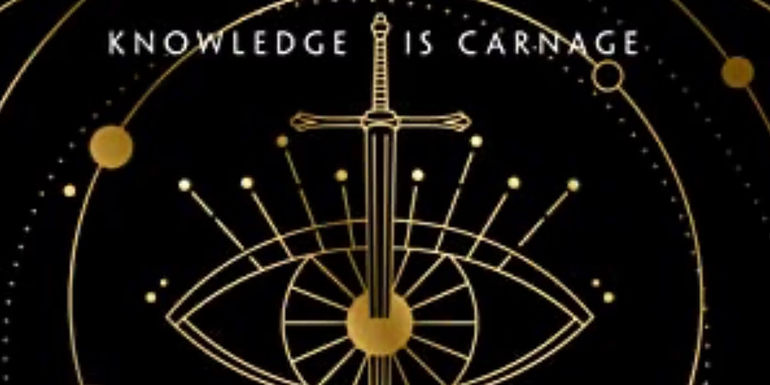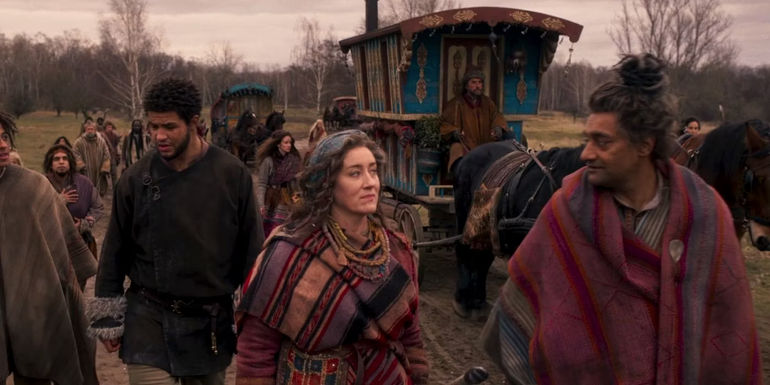
The Art of Adapting: Transforming Amazon's The Atlas Six

Exploring the necessary changes for the upcoming TV show adaptation of The Atlas Six and how it can improve upon its source material.
The Challenge of Character Likability
The anticipation surrounding Amazon's adaptation of The Atlas Series into a TV show is undeniable. The dark fantasy world created by Olivie Blake has captivated audiences, and the prospect of bringing the Medians and the enigmatic Alexandrian Society to life on screen is nothing short of enthralling. However, amidst the excitement, one significant challenge looms large \– the characters.
A sword going through an eye on the cover of The Atlas Six.
Criticism of the Atlas Series has centered around the portrayal of its characters. The Medians, despite possessing extraordinary abilities, have been deemed unlikable and unsympathetic. Their actions and decisions have left audiences grappling with a lack of emotional connection, a fundamental element crucial for sustaining interest in any narrative.
Perrin walks with the Tuatha'an in The Wheel of Time season 1.
The characters in the Atlas Series have been characterized by their unrelatable behavior, self-serving motives, and a distinct absence of camaraderie. Their interactions are marked by intellectual arrogance and constant discord, failing to evolve into more relatable and endearing individuals throughout the narrative. This critical flaw presents the foremost challenge that the creators of The Atlas Six TV show must address to ensure the success of the adaptation.
Learning from the Wheel of Time
Drawing from the experiences of previous fantasy adaptations, particularly The Wheel of Time, provides valuable insight into the pitfalls to be avoided in The Atlas Six TV show. The challenges faced by the former series, notably the struggle to retain audience engagement due to unlikable characters, serve as cautionary tales for the creative team behind The Atlas Six adaptation.
The significance of character likability in fantasy narratives cannot be overstated. While the presence of flawed and complex characters is a hallmark of the genre, the need for at least one relatable and endearing figure to anchor the story is paramount. The Wheel of Time's initial season, marred by unlikable characters, presented a barrier for new viewers, hindering their journey to the core of the narrative.
By acknowledging the missteps of The Wheel of Time and integrating the lessons learned, The Atlas Six adaptation has the opportunity to infuse its characters with redeeming qualities. This strategic approach does not necessitate immediate likability, but rather the provision of elements that foster audience investment and emotional connection. The avoidance of this pivotal change risks alienating potential viewers, impeding the appreciation of the captivating plot and world-building of The Atlas Six.
Elevating the Characters of The Atlas Six
The transformation of The Atlas Six from page to screen offers a compelling prospect to elevate the characters and rectify the identified shortcomings of the source material. The creative freedom inherent in the adaptation process presents an opportunity to imbue the Medians with depth, complexity, and relatability, thereby transcending the limitations of their original portrayal.
By infusing the characters with redeeming qualities, genuine growth, and meaningful relationships, the TV show adaptation can bridge the gap between the characters and the audience. The evolution of the Medians into individuals of substance and resonance will serve as the cornerstone of audience engagement, fostering an emotional investment in the unfolding narrative and the enigmatic world of the Alexandrian Society.
Ultimately, the success of The Atlas Six adaptation hinges upon the effective reimagining and refinement of the characters, charting a course toward a captivating and immersive viewing experience. Through this transformative endeavor, Amazon has the opportunity to craft a compelling dark fantasy narrative that resonates with audiences on a profound and enduring level.













